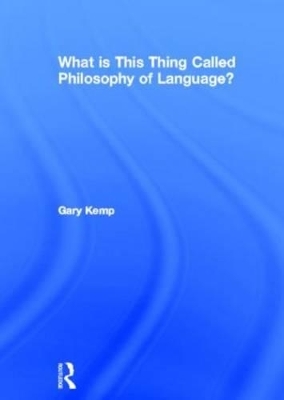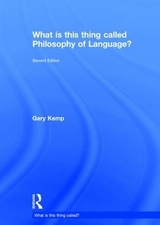
What is this thing called Philosophy of Language?
Seiten
2013
Routledge (Verlag)
978-0-415-51783-6 (ISBN)
Routledge (Verlag)
978-0-415-51783-6 (ISBN)
- Titel erscheint in neuer Auflage
- Artikel merken
Zu diesem Artikel existiert eine Nachauflage
Philosophy of language explores some of the fundamental yet most technical problems in philosophy, such as meaning and reference, semantics, and propositional attitudes. Some of its greatest exponents, including Gottlob Frege, Ludwig Wittgenstein and Bertrand Russell are amongst the major figures in the history of philosophy.
In this clear and carefully structured introduction to the subject Gary Kemp explains the following key topics:
the basic nature of philosophy of language and its historical development
early arguments concerning the role of meaning, including cognitive meaning vs expressivism, context and compositionality
Frege’s arguments concerning sense and reference; non-existent objects
Russell and the theory of definite descriptions
modern theories including Kripke and Putnam; arguments concerning necessity, analyticity and natural kind terms
indexicality, context and modality. What are indexicals?
Davidson’s theory of language and the `principle of charity’
propositional attitudes
Quine’s naturalism and its consequences for philosophy of language.
Chapter summaries, annotated further reading and a glossary make this an indispensable introduction to those teaching philosophy of language and will be particularly useful for students coming to the subject for the first time.
In this clear and carefully structured introduction to the subject Gary Kemp explains the following key topics:
the basic nature of philosophy of language and its historical development
early arguments concerning the role of meaning, including cognitive meaning vs expressivism, context and compositionality
Frege’s arguments concerning sense and reference; non-existent objects
Russell and the theory of definite descriptions
modern theories including Kripke and Putnam; arguments concerning necessity, analyticity and natural kind terms
indexicality, context and modality. What are indexicals?
Davidson’s theory of language and the `principle of charity’
propositional attitudes
Quine’s naturalism and its consequences for philosophy of language.
Chapter summaries, annotated further reading and a glossary make this an indispensable introduction to those teaching philosophy of language and will be particularly useful for students coming to the subject for the first time.
Gary Kemp is Senior Lecturer in Philosophy at the University of Glasgow, UK.
Preface Introduction 1. Naive Semantics 2. Fregean Semantics 3. Russellian Semantics 4. Kripke and Putnam on Naming, Necessity and Essence 5. Possible Worlds Semantics, Context and Indexicality 6. Pragmatics 7. The Propositional Attitudes 8. Davidson’s Philosophy of Language 9. Quine’s Philosophy of Language 10. Wittgenstein’s Alternative. Glossary Bibliography Index
| Erscheint lt. Verlag | 28.2.2013 |
|---|---|
| Verlagsort | London |
| Sprache | englisch |
| Maße | 174 x 246 mm |
| Gewicht | 560 g |
| Themenwelt | Geisteswissenschaften ► Philosophie ► Sprachphilosophie |
| ISBN-10 | 0-415-51783-4 / 0415517834 |
| ISBN-13 | 978-0-415-51783-6 / 9780415517836 |
| Zustand | Neuware |
| Haben Sie eine Frage zum Produkt? |
Mehr entdecken
aus dem Bereich
aus dem Bereich
Aspekte einer Ontologie des Logos
Buch | Hardcover (2024)
Springer Fachmedien (Verlag)
119,99 €
Wie die Menschheit zu ihrer größten Erfindung kam
Buch | Softcover (2022)
C.H.Beck (Verlag)
18,00 €
Macht und Legitimität politischer Sprache im Prozess der europäischen …
Buch | Softcover (2023)
Nomos (Verlag)
74,00 €



